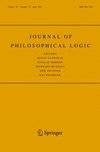天真的真理与证据条件式
IF 0.7
1区 哲学
0 PHILOSOPHY
引用次数: 0
摘要
本文通过将克里普克的真理论与克鲁皮和亚科纳提出的条件证成理论相结合,发展了有效论证等同于真条件的观点。正如将要证明的那样,在包含一个天真真谓词和一个合适条件的一阶语言中,我们可以根据以下论点定义一个有效性谓词:当相应的条件为真时,从前提联结到结论的推论是有效的。如此定义的有效性谓词大大增加了我们的表达资源,并为悖论论证提供了一种连贯的形式处理方法。本文章由计算机程序翻译,如有差异,请以英文原文为准。
Naïve Truth and the Evidential Conditional
This paper develops the idea that valid arguments are equivalent to true conditionals by combining Kripke’s theory of truth with the evidential account of conditionals offered by Crupi and Iacona. As will be shown, in a first-order language that contains a naïve truth predicate and a suitable conditional, one can define a validity predicate in accordance with the thesis that the inference from a conjunction of premises to a conclusion is valid when the corresponding conditional is true. The validity predicate so defined significantly increases our expressive resources and provides a coherent formal treatment of paradoxical arguments.
求助全文
通过发布文献求助,成功后即可免费获取论文全文。
去求助
来源期刊

JOURNAL OF PHILOSOPHICAL LOGIC
PHILOSOPHY-
CiteScore
2.50
自引率
20.00%
发文量
43
期刊介绍:
The Journal of Philosophical Logic aims to provide a forum for work at the crossroads of philosophy and logic, old and new, with contributions ranging from conceptual to technical. Accordingly, the Journal invites papers in all of the traditional areas of philosophical logic, including but not limited to: various versions of modal, temporal, epistemic, and deontic logic; constructive logics; relevance and other sub-classical logics; many-valued logics; logics of conditionals; quantum logic; decision theory, inductive logic, logics of belief change, and formal epistemology; defeasible and nonmonotonic logics; formal philosophy of language; vagueness; and theories of truth and validity. In addition to publishing papers on philosophical logic in this familiar sense of the term, the Journal also invites papers on extensions of logic to new areas of application, and on the philosophical issues to which these give rise. The Journal places a special emphasis on the applications of philosophical logic in other disciplines, not only in mathematics and the natural sciences but also, for example, in computer science, artificial intelligence, cognitive science, linguistics, jurisprudence, and the social sciences, such as economics, sociology, and political science.
 求助内容:
求助内容: 应助结果提醒方式:
应助结果提醒方式:


